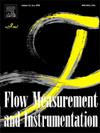Yttria-stabilized zirconia flow sensor for high-temperature and humidity with compensation algorithm
IF 2.3
3区 工程技术
Q2 ENGINEERING, MECHANICAL
引用次数: 0
Abstract
Flow sensors are widely used in industrial production, but their measurement accuracy remains insufficient in high-temperature and high-humidity environments. To address this issue, this study developed a novel flow sensor based on yttria-stabilized zirconia (YSZ) solid-state electrolytes. It integrates both flow velocity and humidity measurement capabilities. This research systematically investigated the effects of environmental temperature and humidity on the sensor's output signals and proposed a compensation algorithm to mitigate temperature and humidity interference, thereby enhancing measurement accuracy. Experimental results showed that the sensor output signal decreases with increasing inlet temperature and increases with rising inlet humidity. Through linear fitting, the relationship between flow velocity output signal drift and environmental temperature and humidity was established. This relationship was then utilized for compensation, resulting in a significant improvement in measurement accuracy. The experiments demonstrated that the sensor exhibits high accuracy and stability in high-temperature and high-humidity environments, effectively optimizing flow velocity detection performance.
氧化钇稳定氧化锆高温湿度流量传感器与补偿算法
流量传感器在工业生产中应用广泛,但其在高温高湿环境下的测量精度仍然不足。为了解决这一问题,本研究开发了一种基于钇稳定氧化锆(YSZ)固态电解质的新型流量传感器。它集成了流速和湿度测量功能。本研究系统研究了环境温湿度对传感器输出信号的影响,提出了一种减轻温湿度干扰的补偿算法,从而提高测量精度。实验结果表明,传感器输出信号随入口温度的升高而减小,随入口湿度的升高而增大。通过线性拟合,建立了流速输出信号漂移与环境温湿度的关系。然后利用这种关系进行补偿,从而显著提高了测量精度。实验结果表明,该传感器在高温高湿环境下具有较高的精度和稳定性,有效优化了流速检测性能。
本文章由计算机程序翻译,如有差异,请以英文原文为准。
求助全文
约1分钟内获得全文
求助全文
来源期刊

Flow Measurement and Instrumentation
工程技术-工程:机械
CiteScore
4.30
自引率
13.60%
发文量
123
审稿时长
6 months
期刊介绍:
Flow Measurement and Instrumentation is dedicated to disseminating the latest research results on all aspects of flow measurement, in both closed conduits and open channels. The design of flow measurement systems involves a wide variety of multidisciplinary activities including modelling the flow sensor, the fluid flow and the sensor/fluid interactions through the use of computation techniques; the development of advanced transducer systems and their associated signal processing and the laboratory and field assessment of the overall system under ideal and disturbed conditions.
FMI is the essential forum for critical information exchange, and contributions are particularly encouraged in the following areas of interest:
Modelling: the application of mathematical and computational modelling to the interaction of fluid dynamics with flowmeters, including flowmeter behaviour, improved flowmeter design and installation problems. Application of CAD/CAE techniques to flowmeter modelling are eligible.
Design and development: the detailed design of the flowmeter head and/or signal processing aspects of novel flowmeters. Emphasis is given to papers identifying new sensor configurations, multisensor flow measurement systems, non-intrusive flow metering techniques and the application of microelectronic techniques in smart or intelligent systems.
Calibration techniques: including descriptions of new or existing calibration facilities and techniques, calibration data from different flowmeter types, and calibration intercomparison data from different laboratories.
Installation effect data: dealing with the effects of non-ideal flow conditions on flowmeters. Papers combining a theoretical understanding of flowmeter behaviour with experimental work are particularly welcome.
 求助内容:
求助内容: 应助结果提醒方式:
应助结果提醒方式:


